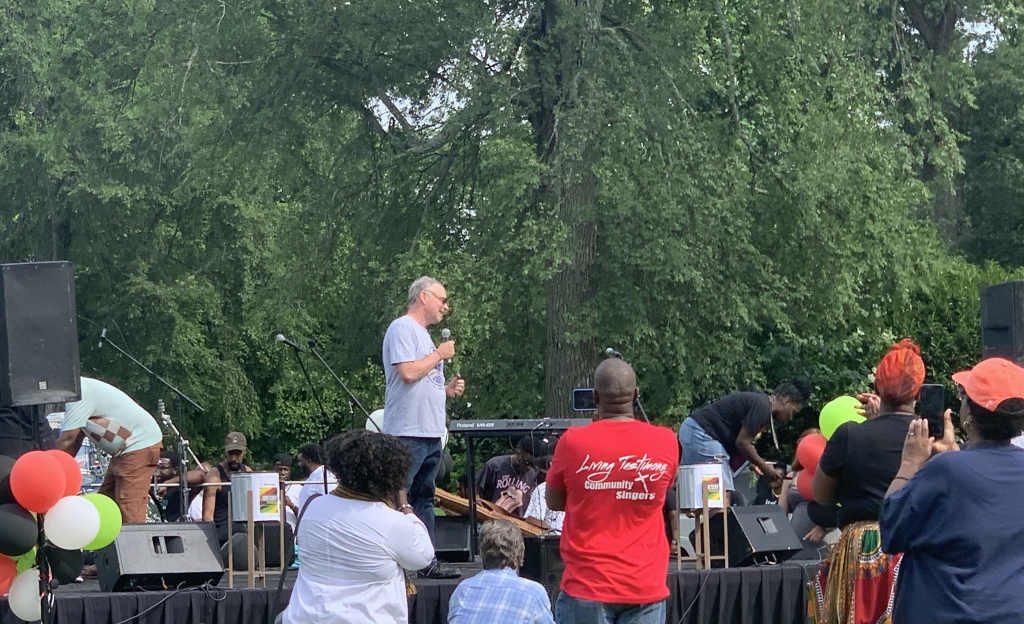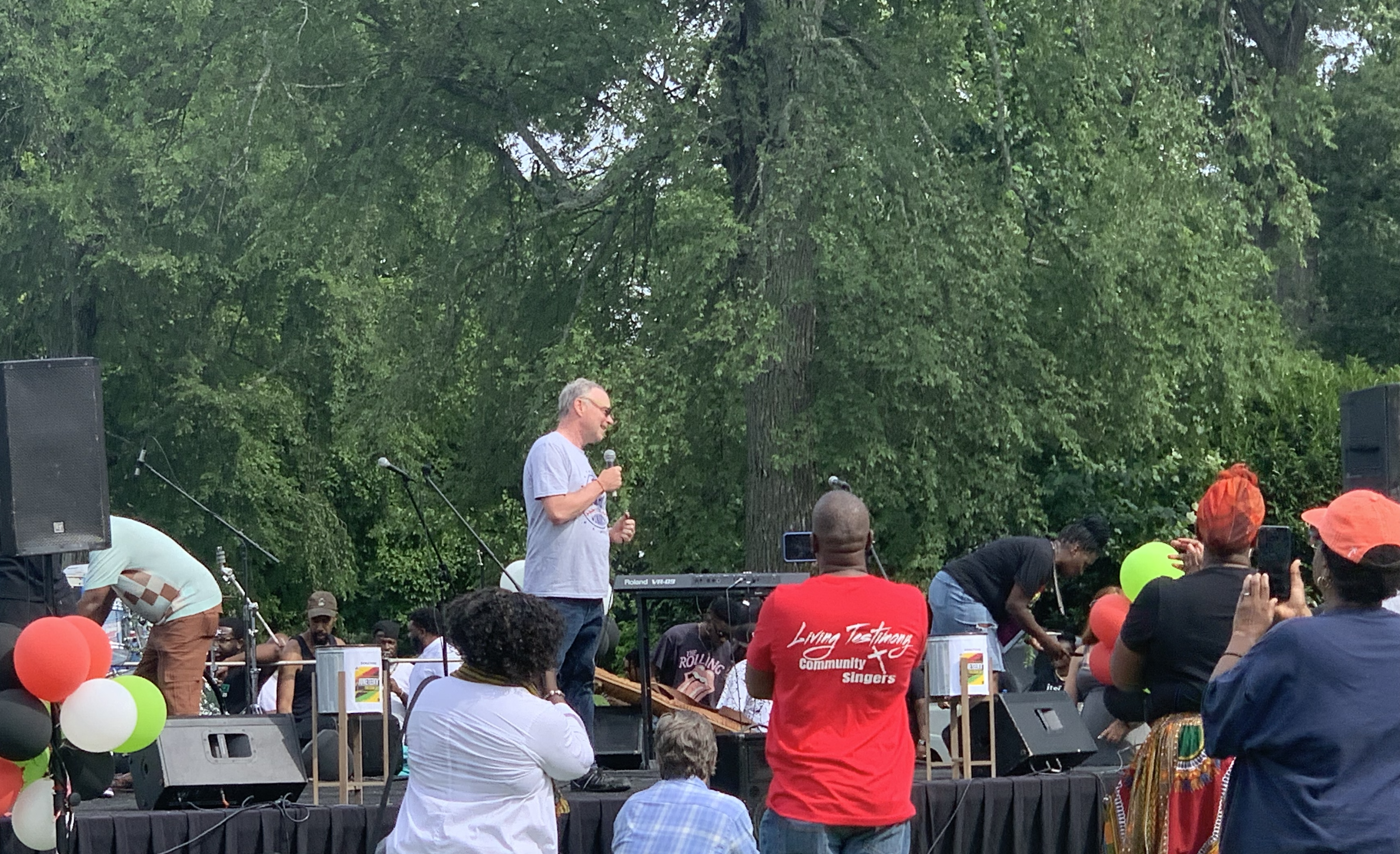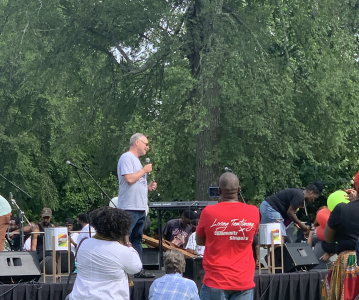“Happy Juneteenth!”
I smiled every time I was greeted this way on Saturday. I’m sure that I came across a little too eager and very socially awkward each time I returned it. Happy Juneteenth is not something I am accustomed to saying. Not yet at least.
Moreover, the day was something of an emotional sampler platter. It started at St. Michael the Archangel Catholic Church, a progressive parish with a surprisingly good sound system and beautiful stained glass. I was there for the memorial service of one of my best friend’s father who lost his battle with cancer before COVID-19 vaccines were widespread–before it was safe for those of us who knew and loved him to gather and mourn his passing.
The service was followed by a casual backyard get-together that was full of Kevin’s favorite things–awful mass-produced beer and baklava, lunch catered by a deli downtown and his daughters and grandchildren all together. When my wife and I began making the rounds to leave early, my friend and her sister immediately protested.
“You’re not leaving.” My friends and I are blunt like this with each other. The translation lands a little softer. This is an emotionally challenging day and I want our friends to be close. I don’t want you to leave.
“We’re doing a Juneteenth thing,” I responded apologetically. The translation was equally as loaded. After the year I just had, I need to be part of this first national recognition. I need to publicly celebrate my Blackness…not just defend it.
We left it there, both a little at a loss for what to feel and contemplating the fact that the service had been scheduled well before Juneteenth became a federal holiday. I was feeling guilty that I’d never previously observed Juneteenth in my 43 years of being on the planet. I can only hope that my friends did not feel guilty for failing to foresee the conflict for the sole Black person in attendance.
By the time my wife and I arrived at the Juneteenth Jamboree in Richmond’s Byrd Park–one of several events held on Saturday–things appeared to be winding down. Vendors were packing up their tables and tents, and attendees were succumbing to Virginia’s 93-degree heat and humidity. A gospel choir bravely soldiered on…as gospel choirs are wont to do.

As I wondered whether or not my wife was feeling uncomfortable, being the only White person in sight, another person of European descent took the stage. Senator Tim Kaine, Hilary Clinton’s one-time running mate and co-sponsor of Senate Bill 475 (that made Juneteenth a federal holiday), was significantly more conspicuous than my wife. I stopped worrying about her discomfort and turned my head (and camera) to the stage. Kaine’s message was simple but powerful.
Recognition is an important step, but it is a comparatively small one. There is much more work to do to eliminate racial injustice in the U.S. We will celebrate today, joyfully…and get back to work tomorrow.
Organizations all over the U.S.–cideries and trade associations, breweries and malthouses, bottle shops and distilleries–wrestled with the same questions I wrestled with this past weekend. How should we publicly mark Juneteenth (if we acknowledge it at all)? How do we do so authentically and naturally? How should people who are not Black be involved? Why has it taken us so long to get here? The complexity of these questions, no doubt, resulted in the decision to quietly let the holiday come and go–a decision I can’t judge anyone for making.
However, if you made this decision with any degree of regret, I encourage you to start thinking about Juneteenth 2022 today. No, I don’t mean you should start planning an elaborate celebration. Rather, I am suggesting that you start laying the groundwork so that the decisions we faced this year are not so challenging.
Tomorrow is Today. Let’s Get to Work!
Whether we are talking about a social media post or another act of external communication or an event, collaboration, or product intended to commemorate Juneteenth, engaging with culturally significant traditions or observances (particularly in a fraught political climate) boils down to the three C’s of inclusive, equitable, and just (IEJ) storytelling–confidence, competence, and credibility.
- Confidence – Do you feel confident speaking about topics related to cultural identity and/or the injustices that are experienced by marginalized individuals and groups?
- Competence – Do you have the competence to intelligently and gracefully engage with conversations and actions centered around cultural heritage and social justice?
- Credibility – Have you been granted the credibility by your employees, partners, and fans, to be perceived as knowledgeable and sincere when you speak about and engage with cultural traditions and issues of social justice?
Chances are, if you experience difficulty in deciding whether or not to acknowledge or engage with cultural observances like Juneteenth (despite a sincere desire to do so), you are experiencing a lack of at least one of the three C’s. Building your organization’s confidence, competence and credibility (like all things in IEJ work) takes time. Below, you’ll find three suggestions that you can start following today to jumpstart the process.
Don’t Wait for Holidays
The perception of opportunism is the enemy of authenticity. That means, engaging with cultural heritage or identity-based observances is inherently a double-edged sword. How many times have you heard an organization (perhaps fairly) take flak because it only acknowledges the contributions of Black people during Black History Month or because it only professes visible allyship with the LGBTQ+ community during pride month? That double-edged sword, however, can be dulled with one simple strategy–don’t wait for holidays and observances to engage with cultural traditions, histories, and communities. If conversations about cultural histories and participation in cultural heritage events are everyday occurrences for your organization, you will eradicate the perception of opportunism for all but the most cynical.
Do Your Homework
Perhaps this should go without saying, but it’s a great idea to build a base of knowledge about cultural traditions before engaging with them. While amassing information on “the Google” is one way to go about learning, it’s a lost opportunity to engage with your staff or members. Providing education and cultural enrichment activities for the organization is an excellent charge for organizational affinity groups/employee resource groups (ERGs) or diversity committees for organizations that have them. This kind of learning also represents a painfully underutilized opportunity to engage with the community. Craft beverage makers are often eager to educate and share knowledge with underrepresented groups, but seldom recognize opportunities to learn from these same populations in their communities.
Pass the Mic
Finally, it’s always a good idea to ask yourself who you are centering in conversations and actions about social justice and cultural heritage. The most effective and important role that an organization might play is that of amplifier. Start actively listening to voices in your community that are potentially aligned with your organization’s values and goals. Do the work to form relationships with the voices you find to be most valuable. “I watched/read/listened to your ________ and it really resonated with me because _______. Thank you,” is a great way to start that process. By the time Juneteenth rolls around again, you’ll have forged thoughtful connections with individuals and organizations you can enthusiastically support or, even better, you’ll have opened the door for a fruitful partnership or collaboration that educates and uplifts the communities inside and outside of your organization.


